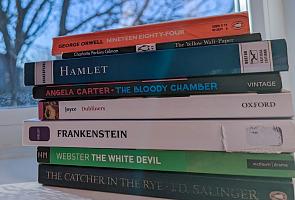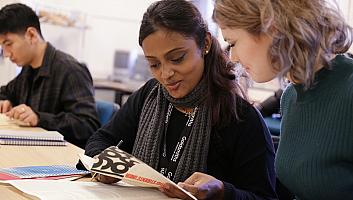BA (Hons)
English with Creative Writing
Content navigation menu
Why study BA English with Creative Writing at Goldsmiths
The degree is ideal if you are curious about literature, with the imagination to turn that curiosity into creativity.
- This flexible BA English with Creative Writing degree allows you to choose from a range of topics – comparisons of literature across different cultures and art forms (also known as comparative literature), American literature and culture, and diverse aspects of language use in linguistics modules.
- Goldsmiths has one of the most established and long-running creative writing centres in UK Higher Education, and many of our graduates are now leading writers and editors in their field.
- Our teaching staff of celebrated writers and scholars are ready to support you and your work as a Goldsmiths student.
- We’re regularly visited by literary guest speakers, and our students have recently enjoyed events with Ali Smith, George Saunders, Bernadine Evaristo, Nikesh Shukla, Michael Rosen, Eimear McBride and Howard Jacobson.
- Our forward-thinking approach to the fields of creative writing and literary studies is supported by our hosting and running of the Goldsmiths Prize, awarded annually to work that pushes the boundaries of the novel.
- Your literary and creative studies will be supported by lectures and seminars that will give you practical advice to help you improve your essay writing and refine your research strategies.
- Our location on the doorstep of central London means that you will have easy access to one of the most diverse, historic, and dynamic literary centres in the world.
Contact the department
If you have specific questions about the degree, contact Dr Jack Underwood.
UCAS code
Q3W8
Entry requirements
A-level: BBB
BTEC: DDM
IB: 33 points overall with three HL subjects at 655
Length
3 years full-time or 4-6 years part-time
Fees
Home - full-time: £9250
Home - part-time: £4625
International - full-time: £19640
Department
What you'll study
In your first year, you'll take the following compulsory modules:
| Module title | Credits |
|---|---|
| Explorations in Literature | 30 credits |
| Genre | 30 credits |
| Foundation Workshop in Creative Writing | 30 credits |
| Ideas in Practice | 15 credits |
| Creative-Critical Project | 15 credits |
Note about optional modules (if available): The above is indicative of the typical modules offered, but is not intended to be construed or relied on as a definitive list of what might be available in any given year. The module content and availability is subject to change.
Teaching style
This programme is taught through a mixture of scheduled learning - lectures, seminars and workshops. You’ll also be expected to undertake a significant amount of independent study. This includes carrying out required and additional reading, preparing topics for discussion, and producing essays or project work.
How you'll be assessed
You’ll be assessed by a variety of methods, depending on your module choices. These include portfolios of original creative writing and critical commentaries on your work for each of the workshops, coursework portfolios, long essays and examinations (various timescales and formats).
Entry requirements
We accept the following qualifications:
A-level: BBB
BTEC: DDM
International Baccalaureate: 33 points overall with three HL subjects at 655
UAL Extended Diploma: Merit overall
Access: Pass with 45 Level 3 credits including 30 Distinctions and a number of merits/passes in subject-specific modules
Scottish qualifications: BBBBC (Higher) or BBC (Advanced Higher)
European Baccalaureate: 75%
Irish Leaving Certificate: H2 H2 H2 H2
Additional requirements
Grade B in A-level English Literature/A-level English Language and Literature/A-level English Language is required if you have studied A-levels.
Alternatively, an equivalent English subject will be accepted eg Grade 5 in IB Higher Level English.
Alternative qualifications
See our full list of undergraduate entry qualifications.
We welcome students with a range of educational experiences. If you believe you may not meet the standard qualification requirements we would still encourage you to apply because we consider all aspects of your application when making a decision.
We’ll pay particularly careful attention to your personal statement, which is your opportunity to demonstrate your interest in the subject you’ve applied for. Your referees are also welcome to include any relevant contextual comments around your academic achievements. We’ll look at all these things when making a decision on your application, as well as your qualifications and grades.
International qualifications
We also accept a wide range of international qualifications. Find out more about the qualifications we accept from around the world.
If English isn’t your first language, you will need an IELTS score (or equivalent English language qualification) of 6.5 with a 6.5 in writing and no element lower than 6.0 to study this programme. If you need assistance with your English language, we offer a range of courses that can help prepare you for degree-level study.
Fees and funding
Annual tuition fees
These are the UG fees for students starting their programme in the 2024/2025 academic year.
- Home - full-time: £9250
- Home - part-time: £4625
- International - full-time: £19640
If your fees are not listed here, please check our undergraduate fees guidance or contact the Fees Office, who can also advise you about how to pay your fees.
It’s not currently possible for international students to study part-time if you require a Student Visa, however this is currently being reviewed and will be confirmed in the new year. Please read our visa guidance in the interim for more information. If you think you might be eligible to study part-time while being on another visa type, please contact our Admissions Team for more information.
If you are looking to pay your fees please see our guide to making a payment.
Funding opportunities
We offer a wide range of scholarships and bursaries, and our careers service can also offer advice on finding work during your studies. Find out more about funding your studies with us.
Additional costs
In addition to your tuition fees, you'll be responsible for any additional costs associated with your course, such as buying stationery and paying for photocopying. You can find out more about what you need to budget for on our study costs page.
There may also be specific additional costs associated with your programme. This can include things like paying for field trips or specialist materials for your assignments. Please check the programme specification for more information.
Our alumni
Poetry
We are a centre of excellence for poetry. Recent BA graduates include:
- Rachael Allen, whose debut poetry collection ‘Kingdomland’ was published by Faber in 2019 to great acclaim, and who now works as Poetry Editor for Granta.
- Poet and non-fiction writer Sophie Collins, author of the ground-breaking non-fiction work, ‘Small White Monkeys: On Self-Expression, Self-Help and Shame’ published by Bookworks in 2018, and a collection of poems, ‘Who Is Mary Sue?’ Published by Faber in 2018, and selected as a Poetry Book Society Choice. Sophie was awarded a Fellowship by the Royal Society of Literature as part of its inaugural 40 Under 40 scheme in 2018, and is now a lecturer in creative writing at the University of Glasgow.
- Ella Frears is author of ‘Shine, Darling’, her debut collection published by Offord Road Books in 2020, which was shortlisted for both the Forward and TS Eliot Prizes, as well as being selected as a Poetry Book Society Recommendation.
- Cecilia Knapp was named Young Person’s Poet Laureate for London in 2020 and has been widely commissioned and held residences internationally. Her theatre pieces ‘Finding Home’ and ‘Losing the Night’ both opened to sell out London runs at The Roundhouse before touring the UK. Her debut novel ‘Little Boxes’ is forthcoming from The Borough Press (Harper Collins) while her debut poetry collection ‘Peach Pig’ was published by Corsair in 2022. She curated the anthology ‘Everything is Going to be Alright: Poems for When you Really Need Them’, published by Trapeze in 2021.
- Aria Aber is the author of the critically acclaimed poetry collection ‘Hard Damage’, published by University of Nebraska Press in 2019. After graduating from Goldsmiths, Aria left to study an MFA in Creative Writing at New York University, before winning a 2020 Whiting Award in Poetry and continuing her practice as a Wallace Stegner Fellow in Poetry at Stanford University.
Other recent poetry publications by former undergraduates include ‘Glass’ by Emily Cooper, published by Makina Books, ‘Platinum Blonde’ by Phoebe Stuckes, published by Bloodaxe, ‘Earth Sign’ and ‘HYPERLOVE’ by Naomi Morris, published by Partus Press and Makina Books, and ‘My Bodies This Morning This Evening’ by Eve Esfandiari Denney, 2022 published by Bad Betty.
Prose
Our poets’ successes have been matched in recent years by our prose writers. Four novels that began as creative writing dissertations and portfolios have since been published or acquired for publication.
- Sara Jafari’s debut novel ‘The Mismatch’ was published by Penguin in 2021, started life on the Creating the Text module.
- Marlowe Granados’ best-selling debut, ‘Happy Hour’, also published by Verso, formed part of Marlowe’s third year creative writing dissertation.
- Abi Andrews debut, ‘The Word for Woman is Wilderness’, published by Serpent’s Tail in 2018, was first aired in a workshop taken during her third year on the BA Hons English Creative Writing programme.
- Paddy Crewe’s debut novel, ‘Yip’, was published in 2022 by Penguin. It has been longlisted for the 2023 Walter Scott Prize for Historical Fiction, the Authors Club Best First Novel Award and the 2023 Wilbur Smith Adventure Writing Prize.
- Kandace Siobhan Walker’s short story ‘Deep Heart’ was winner of the 2019 4th Estate and Guardian short story prize (Kandace was also winner of the 2020 White Review Poetry Prize).
- Goldsmiths Creative Writing BA and MA graduate Dizz Tate’s debut novel ‘Brutes’ was published by Faber in February 2023.
Non-fiction
Aside from literary forms, Goldsmiths undergraduate creative writing alumni also include a number of exciting non-fiction writers and journalists:
- Daisy Jones, who is Associate Editor of VICE UK and author of ‘ALL THE THINGS SHE SAID: Everything I Know About Modern Lesbian and Bi Culture’, published by Hachette in 2021;
- Charlie Brinkhurst Cuff is an award-winning journalist, book editor, columnist and podcast host. She is currently Managing Editor at Skin Deep and previously worked as a Senior Staff Editor at the New York Times and enjoyed a celebrated tenure as Editor-in-Chief at ‘gal-dem’ magazine. She has written for the ‘Guardian’, ‘Observer’, ‘ipaper’ and ‘Metro’, and has worked as weekend editor and writer at ‘Dazed’. Excitingly, her debut collection of non-fiction, ‘Black Joy’ was published under the Penguin imprint in hardback in September 2021.
- Felix Petty, is head of content at ‘Kaleidoscope’ after working as executive editor at i-D magazine.
Prize-winning alumni
Since 2010, 12 of our alumni have gone on to win the prestigious Eric Gregory Award, awarded annually by the Society of Authors for a collection by British poets under the age of 30.
Other recent alumni have gone on to win the Ted Hughes Award for poetry, the Somerset Maugham Award, the Rathbones Folio Prize, the Rooney Prize for Irish Literature, the Sunday Times Young Writer of the Year, The Guardian & 4th Estate Short Story Prize, the European Union Prize for Literature, the Dylan Thomas Prize, the White Review Poetry Prize, with other graduates being shortlisted for the Forward Prize and the TS Eliot Prize.



